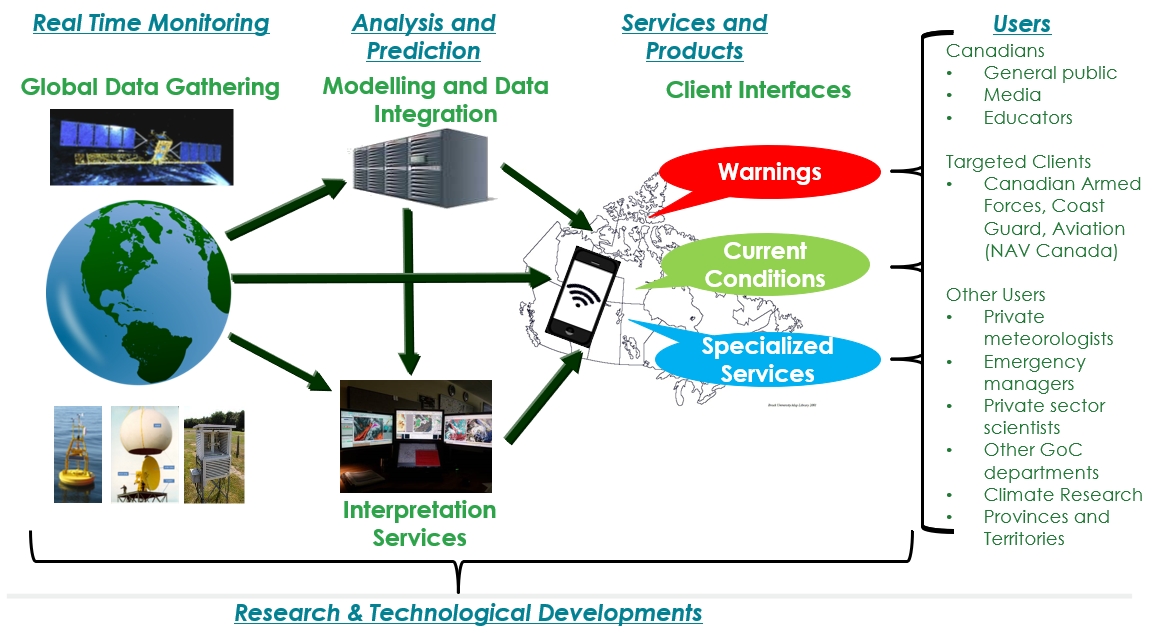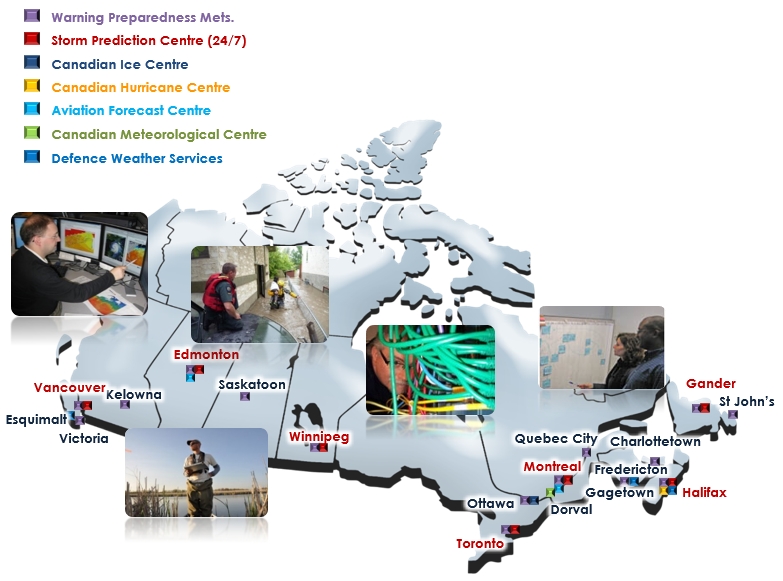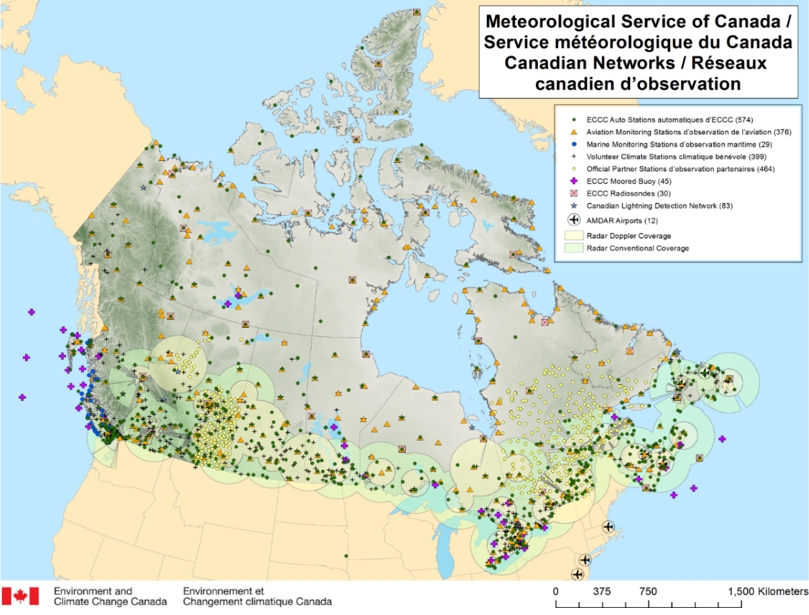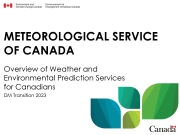Deputy Minister transition binder 2023: Meteorological Service of Canada
Presentation outline
- Context and mandate
- Monitoring
- Modelling and high performance computing
- Prediction services
- Minister’s Mandate Letter
Increasingly unprecedented weather has become the new normal, putting communities and the economy at risk
- Climate action failure and Extreme weather identified as top 2 most severe global risks over the next 10 years (World Economic Forum, Global Risk Report 2022).
- The demands for timely, interpretive information and advice regarding weather conditions are increasing.
- Strengthening weather and environmental prediction services is essential to provide early warning of impending impacts and support robust emergency preparedness and response.
2020
Calgary region hailstorm/prairie winds
- Significant hail
- 50-60mm of rain
- 4th highest insured damage event in Canadian history ($1.2B)
2021
West coast heat wave
- 789 new daily high temperatures records set in Canada between June 26 and July 4
- Major health risk to vulnerable populations (619 heat related deaths)
- Significant ecological impact on water quality and animal life
British Columbia flooding
- Extreme rainfall, power outages, dyke breaches, mudslides and extensive flooding
- 4 fatalities
- Impacts also included evacuation orders, road and rail closures, and gasoline purchase limits
2022
Ontario and Quebec derecho
- A fast-moving line of storms swept along Canada’s most densely populated corridor
- 12 fatalities
- 6th most expensive natural disaster in Canadian history
Hurricane Fiona, Atlantic provinces
- Wind gusts reached as high as 179km/h
- 80% of NS and 95% of PEI were impacted by power outages
- 1 fatality
- Exceeded $800M in insured losses
The Meteorological Service of Canada has a unique federal mandate
- Provide Canadians with authoritative information on weather, water quantity, climate, ice, and air quality 24 hours/day, 365 days/year.
- Monitor, predict and warn Canadians of high impact weather, air quality and other environmental conditions to mitigate and reduce disaster-related risks.
- Support mission-critical operations of federal, provinces and territories, municipal, and private organizations that rely on MSC’s infrastructure, ECCC science capacity, and deliver on their mandate (e.g. aviation, emergency management, water management, military & marine ops).
- Deliver on international responsibilities related to data exchange, atmospheric modelling (e.g. emergency related to airborne substances, volcanic ash, chemical, biological, nuclear and radioactive (CBNR)), and marine forecast and warnings for defined areas of the Arctic Ocean.
The MSC operates an integrated system

Text description
Image presenting the integrated system of the MSC. It consists of the following benefit chains: “Real time Monitoring”, “Analysis and Prediction”, and “Services and Products”. The image also shows the interactions between “Global Data Gathering”, “ Modeling and Data Integration”, “Interpretation Services” and “Client Interfaces” which is composed of: “warnings”, “current conditions”, and “specialized services”. Finally, the image identifies users as Canadians (general public, media, educators), targeted clients (Canadian armed Forces, Coast Guard, Aviation), and other users (private meteorologists, emergency managers, private sector scientists, other GoC departments, climate research, provinces and territories).
With staff located across Canada

Text description
A map of Canada that illustrates some of the cities where MSC’s offices are located : Vancouver, Esquimalt, Victoria, Kelowna, Edmonton, Saskatoon, Winnipeg, Ottawa, Dorval, Montréal, Québec, Gagetown, Fredericton, Charlottetown, Halifax, Gander, St.John’s. Images are overlaid on the map, including (from left to right): a forecaster at a work station; a field technician in a swamp; an emergency management crew rescuing a girl during severe flooding; a technician looking at wires; two employees discussing while using a whiteboard.
- 1445 FTEs in over 50 offices in 45 cities across Canada
- Highly specialized expert workforce (meteorologists, scientists, engineers, etc)
- ~240M annual budget* including up to 46M/year of vote netted revenue
- Significant national asset footprint (observation networks)
*Decrease to ~200M in 23/24 due to sunsetting of B-base allocations
Monitoring the state of the environment is essential and at the core of this scientific organization
Every day the MSC collects, processes, and disseminates nearly one million domestic observations, from coast to coast, through several observing networks:
- Weather radar network which includes 32 operational radars.
- Marine weather network composed of 45 moored buoys, 49 Automatic Volunteer Observing Ships, and 19 drifter buoys.
- Surface weather and climate network comprising 575 automatic weather stations, 225 cooperative climate network stations, and 29 lighthouse stations.
- Upper-air network composed of more than 30 stations across Canada.
- Satellite-borne sensors delivering data to 8 ground receiving stations.
- 82 lightning detection sensors.
- ~2200 hydrometric monitoring stations (operated by the MSC on a cost-shared basis with the provinces and territories).

Text description
A map of Canada that shows the locations of infrastructure belonging to MSC’s various monitoring networks : ECCC Auto Stations automatiques (574), Aviation Monitoring Stations d’observation de l’aviation (376), Marine Monitoring Stations d’observation maritime (29), Volonteer Climate Stations climatique bénévole (399), Official Partner Stations d’observation partenaires (464), ECCC Moored Buoy (45), ECCC Radiosondes (30), Canadian Lightning Detection Network (82), AMDAR Airports (12), Radar Doppler Coverage, Radar Conventional Coverage. Infrastructures are found throughout Canada but the majority is located along Canada’s Southern boarder with the United States of America, where most of Canada’s population is situated.
Computer prediction models are the engine of weather forecasting
- Continuous environmental observations are the foundation of weather prediction modelling.
- Models run continuously at global and Canada-wide scales, using high performance computing, to provide predictions of the future state of the atmosphere out to 7 days and beyond.
- Canada’s vast landscape necessitates top tier computer modelling capacity in order to fill gaps in on-the-ground monitoring.
- ECCC’s meteorological modelling platform and expertise supports whole of government priorities, including emergency management.
- Shared Services Canada manages ECCC’s high performance computing (HPC) capacity.
HPC supports weather and climate programs, as well as international commitments
- ECCC’s HPC feeds directly into improved operational models for weather disseminated by MSC, climate products disseminated by the Canadian Centre for Climate Services, and air quality prediction with HC and provinces.
- HPC also supports ECCC’s key international commitments under the United Nations Framework on Climate Change, World Meteorological Organization (WMO), and others. Examples include:
- Contributions to all international activities that underpin Intergovernmental Panel on Climate Change Assessments.
- 1 of 13 WMO Global Producing Centres for long range forecasts up to the season.
- 1 of 4 WMO Decadal Climate prediction Producing Centres (with Barcelona Supercomputing Center, Germany’s Deutscher Wetterdienst, and the UK Met Office).
- 1 of 9 Volcanic Ash Advisory Centres, providing specialized products for aviation safety during volcanic eruptions and 1 of 10 Regional Specialized Meteorological Centres that provides real-time 24/7 specialized atmospheric dispersion model products for environmental emergency.
Meteorologists analyze predictions and changing conditions to produce forecasts, warnings, and advice
In 2021:
- 115K public weather forecasts
- 17K severe weather warning
- 42K marine, ice and sea-state forecasts
- 244K air quality forecasts
- >11,000 client and media calls
- 90% Canadians seek weather information every day
- WeatherCAN app: >2.5M downloads
- ~4.5TB data downloaded daily by users
- Authoritative voice for issuing alerts and warnings to Canadians, public health authorities, and emergency management organizations.
- Provide impact-based services to public authorities to improve resilience of Canadians to unprecedented and extreme weather.
- Seven regionally-based prediction centers monitor the evolving weather 24 h/day, 7 day/week (along with the Canadian Hurricane Centre, 2 aviation forecast centres, the Canadian Ice Service and 3 defence weather centres).
- Warning Preparedness Meteorologists interact with media and P/T emergency managers and first responders.
- Canadians have access to weather services through multiple channels:
- weather.gc.ca;
- WeatherCAN app;
- Facebook and Twitter; and
- Weatheradio.
MSC provides data, products and services to many partners
Federal partners
- Public Safety
- National Defence
- Fisheries & Oceans
- Canadian Coast Guard
International community
- United Nations World Meteorological Organization (WMO)
- Group on Earth Observations (GEO)
- MOUs with US, China, France and UK
- Agreements with Australia, Finland, Germany
- Cooperation Agreement with EU Copernicus Programme.
Province and territories
- Cooperative framework with P/Ts on water management, data collection, emergency preparedness and air quality
- Share meteorological and hydrological data to support decision-making
Private, academia and consortia
- Pelmorex (i.e. The Weather Network)
- Partners with academia to advance and leverage applied science
MSC relies on strategic partnerships with S&T Branch for scientific research, Corporate Services Finance Branch as a key enabler, and Shared Services Canada to access high performance computing (HPC)
Canada’s hydro-meteorological services must continue to support decision-making at all levels of society to increase climate resilience
- Regular investments are made to support and improve Canada’s hydro-meteorological services. We are at the stage of the cycle where it is time to reinvest.
- To that end, Minister Guilbeault’s mandate letter includes a commitment to:
“Invest in the Meteorological Service of Canada to upgrade infrastructure, including information technology, to ensure it continues to effectively perform its vital functions of monitoring changes in the weather, climate, water, ice and air quality, and predicting weather and environmental conditions.”
- Strengthening Canada’s hydro-meteorological services will:
- futureproof ECCC’s operations in response to changing conditions and evolving demands,
- strategically position the department to continue delivering world class services for the next decade, and
- ensure that Canadians have the information they require to protect their lives, property, and livelihood.
